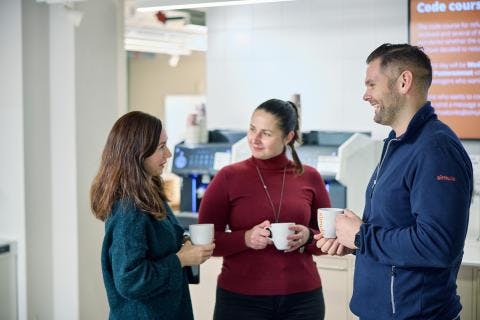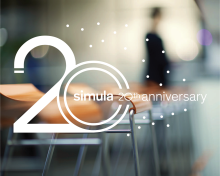Milestones
20th Anniversary celebration
In February of 2022, Simula celebrated its first 20 years as an independent research institution.
Milestones
2024 - Simula surpasses 200 PhD students and 600 Masters students that have defended and were supervised by Simula researchers, and celebrates 10th anniversary of the Summer School in Computational Physiology. The collaborative K.G. Jebsen Centre in Brain Fluid Research opens. Simula Consulting is merged with Simula.
2023 - Dr. Lillian Røstad is appointed as Simula’s new Managing Director. Gründergarasjen is spun out of Simula into an independent company. Simula Learning is dissolved.
2022 - Simula celebrates its 20th Anniversary. Simula reorganises its educational activities: Simula Academy opens, and SSRI rebrands to Simula Learning.
2021 - Simula@BI officially opens, and is a collaboration between Simula and BI Norwegian Business School. Simula headquarters moves to its new location in
downtown Oslo.
2020 - Simula Consulting is established to provide deep-tech R&D services to customers. Simula develops the Smittestopp app for digital contact tracing of Covid-19. Simula and Inria sign a memorandum of understanding.
2019 - Simula joins ERCIM, the European Research Consortium for Informatics
and Mathematics. Kalkulo is sold to Bluware.
2018 - SimulaMet opens, and is jointly owned by Simula and Oslo Metropolitan University. Simula is a founding member of NORA, the Norwegian Artificial Intelligence Research Consortium. Simula announces the Baby Bonus, which
promotes a family-friendly environment for all employees.
2017 - Simula surpasses 100 PhD students that have defended and were supervised by Simula researchers. Simula’s research areas are all given a score of “excellent”
in the in-depth scientific evaluation by the Research Council of Norway.
2016 - Simula UiB opens, and is jointly owned by Simula and the University of Bergen. The 1st volume of the open access series Simula SpringerBriefs on Computing is published.
2015 - SUURPh (Simula-UiO-UCSD Research and PhD training program) is established, and is funded directly by the Ministry of Education and Research.
2014 - As a kickstart of Horizon 2020, Simula gets a record turnout of EU projects within the LEIT-ICT. Simula launches the Summer School in Computational Physiology.
2013 - Simula Garage (Gründergarasjen) opens its doors for IT-oriented entrepreneurs. Simula is awarded the Gender Equality Award by the Norwegian Ministry of Education and
Research. CRNA becomes a permanent research centre, funded indefinitely by the
Ministry of Transport.
2012 - In the national evaluation of research in ICT, Simula ranks 1st in all of Norway with respect to average scores.
2011 - Simula is awarded the Certus (SFI) Centre for Research-based Innovation. CRNA is given a new 5-year period by the Ministry of Transport.
2010 - The Journal of Systems and Software ranks Simula as the world’s most productive institution in systems and software research.
2009 - The book Simula Research Laboratory – by thinking constantly about it is published by Springer.
2008 - Simula is ranked 3rd on the Journal of Systems and Software’s list of the world’s most productive research institutions within systems and software engineering.
2007 - Simula School of Research and Innovation is established.
2006 - Kalkulo is established. The Centre for Resilient Networks and Applications (CRNA) is started. Simula is awarded a Centre of Excellence (SFF) in Biomedical Computing.
2005 - The Norwegian parliament extends Simula’s research grant to 2015.
2004 - Simula Innovation is established.
2003 - Simula’s strategy of directed basic research is formulated and implemented.
2002 - Professor Aslak Tveito is appointed Managing Director, and SRL is established as a limited company.
2001 - Simula is established, and its 41 employees move from the University of Oslo to Fornebu.
Simula - where ideas are born and take flight
Since 2001 Simula has maintained its foundational activities of research, education and innovation. This work is mission-driven, contributing to the research community, academia and society, but that's not all.

